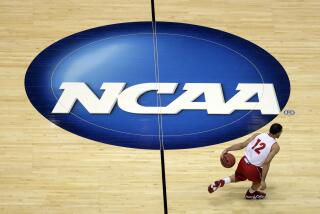Academic Eligibility Debate Far From Over : NCAA: The Black Coaches Assn. still opposes standardized college entrance examinations.
Last winter, the threat of a nationwide boycott of some college basketball games was averted when the Justice Department arranged for federal mediation between the Black Coaches Assn. and NCAA leaders.
Now, with the academic school year under way across the country, it is increasingly clear that the threat will cloud the 1994-95 basketball season.
The gulf between college administrators and black coaches was exposed this week when Congresswoman Cardiss Collins (D-Ill.) supported BCA assertions that standardized college entrance examinations are racially and culturally biased.
NCAA leaders deny that.
Surrounded by some of the country’s leading black coaches at a Washington news conference, Collins called on the NCAA to abandon the use of the test as a requirement for athletic eligibility.
“People have to realize that the NCAA is the largest governing body for athletics, not education,” Collins said. “Why the NCAA uses this test is beyond me.”
In aligning with Collins, who heads the Subcommittee on Commerce, Consumer Protection and Competitiveness, black coaches have found a powerful ally in their long fight to increase opportunities for minority athletes.
At issue today are stricter academic requirements for freshman athletes that will be implemented next August unless the NCAA membership unexpectedly changes its course of action at January’s convention in San Diego.
During a meeting this week with Cedric Dempsey, NCAA executive director, the coaches expressed continued concerns about the NCAA’s Propositions 48 and 16, legislation that establishes eligibility requirements for freshman athletes. They claim the requirements have a disproportionate impact on athletes in football and basketball, sports in which a majority of blacks compete.
Under the existing guidelines, known as Prop. 48, an athlete must score at least 700 out of 1,600 on the Scholastic Aptitude Test or 17 on the American College Test, and have a 2.0 grade-point average in 11 core high school courses to be eligible.
Under Prop. 16, passed at last year’s NCAA Convention, a 700 SAT or 17 ACT score will require a 2.5 GPA in 13 core courses. But Prop. 16 also offers a sliding scale. For instance, if a student scores 900 or 21 on the respective tests, the GPA is lowered to 2.0 in the core courses.
USC basketball Coach George Raveling noted that some colleges, below the Division I level, do not use standardized test scores for admission.
“And they’ve shown no noticeable decrease in the quality of students or the success of the students,” he said. “The standardized test is just an instrument to keep minorities in their place, just like voter registration.”
In an effort to challenge standardized testing, Collins assembled 13 academicians last spring to analyze the NCAA’s statistical studies.
Their conclusions, announced at the news conference, supported contentions that the tests are not good predictors of academic success and should not be used for eligibility requirements.
“After looking at the data, it just seems to me that Props. 48 and 16 certainly have the veneer of being a quick-fix PR campaign more than anything else,” said Russ Gough, an ethics professor at Pepperdine University who was one of the analysts.
“I don’t think 48 or 16 are having any impact on restoring academic integrity.”
The NCAA, however, is expected to continue to use standardized tests in its admissions formula.
“What people don’t remember is every opportunity denied is an opportunity created,” said Jerry Kingston, an Arizona State economist and member of the NCAA Council.
Kingston, an expert in analyzing graduation rates, said that when a black is denied a scholarship because of academic deficiencies, he or she usually is replaced by another black student.
The NCAA’s powerful Presidents Commission is supporting legislation that would modify Prop. 16 to admit partial qualifiers with 2.0 GPAs in core courses but test scores as low as 600. A partial qualifier is allowed to accept financial aid and can practice with his or her team, but cannot compete as a freshman.
Although the membership usually supports the Presidents Commission, it will have five other options to consider, including adopting Prop. 16 as it stands. Among the proposals that will be presented during the convention is one eliminating freshman eligibility standards altogether.
That might be the only acceptable scenario for the coaches, who are planning strategy before the season begins in November.
“They’re very, very close to doing it,” one source said of a boycott. “They’re using it as leverage in talking with the NCAA.”
Collins and the coaches, who will meet again in October, also have discussed the possibility of seeking an injunction to stop the NCAA from enacting the eligibility requirements.
Joseph N. Crowley, NCAA president, said the BCA’s strategy could backfire. He wants the debate on academic eligibility to focus on the merits of proposals and nothing more.
“The BCA boycott does not enter into the discussion,” said Crowley, president of the University of Nevada. “The threat of a boycott would risk producing a result that the black coaches are interested in.”
Crowley said the report by Collins’ analysts will have little influence on the membership because the debate over the use of standardized tests is a long one.
“Some institutions use them, some don’t,” he said. “I don’t know if the truth has been discovered yet.”
More to Read
Go beyond the scoreboard
Get the latest on L.A.'s teams in the daily Sports Report newsletter.
You may occasionally receive promotional content from the Los Angeles Times.










